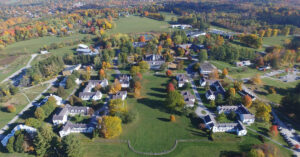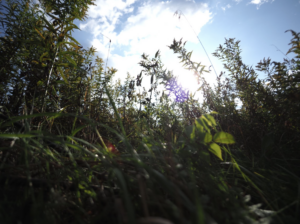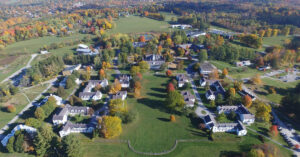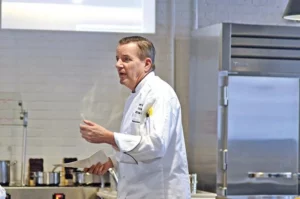Trigger Warning: Mentions of white supremacy and neo-Nazis
Cass Taylor is a senior studying literature, writing, and community building. They love to read and do needlework – knitting and crocheting – in their free time.
We talked about their experiences with being pagan and practicing in today’s day and age, broaching about the issues one may face in the community and how white supremacy and Nazism have infiltrated paganism today, why cultural appropriation is a big issue, as well as what it means to be spiritual and have a deeper connection with the supernatural.
We also touched on their interactions with the paranormal on the Bennington campus.
Iva: So tell me a little about your connection to the supernatural, your beliefs, and practices.
Cass: Yeah, absolutely. I’m a practicing pagan, right? So I practice mainly Norse paganism, which is super convoluted really because there’s a lot of Norse paganism out there right now that’s connected to white supremacy and Nazism, I have no association with that. And so I do a lot of work with the metaphysical. I do a lot of work with the passing of the veils, things we don’t super understand in this world. So I am a believer in the supernatural and a believer in ghosts. Not necessarily the kind of ghosts that are on a lot of ghost hunting shows, but I’m definitely a believer in that kind of world. I’ve had a couple of experiences specifically on the Bennington campus that have been a little spooky, have been a little supernatural. And I tend to write a lot of horror, specifically supernatural, especially about cryptic beings.
Iva: That’s really interesting. Before you settled for Norse paganism, did you explore or practice something else? Or did that come first?
Cass: I was raised going to a Unitarian meeting house, which I loved mainly because I was not raised very religious. My father’s side of the family is very, very Catholic. So I did go to vacation Bible school and I had some of that weird Catholic influence – again with Boston, you get the Boston, Irish, Catholic thing going, which can be very intense. And I knew that I didn’t super love that, but I did really like going to the Unitarian meeting house. I loved the community that came from that, but I think while the community was great and I love that I didn’t fit in with a lot of the religions I saw represented there. So I think that I have been exposed to religion and spirituality earlier, I just hadn’t quite found somewhere that I fit and then I found something that did.
Iva: Do you have a reason why you started practicing paganism or was it something that just all of a sudden felt right?
Cass: Yeah, I think I started it kind of right when I came to college. And I think it definitely coincided with moving out and being on my own for the first time. Because when you’re at home with your parents, I think there’s a lot of stuff you don’t get to explore… A lot of stuff you don’t get to experience. I knew a lot of people who practice paganism, I met people here who practice paganism, and I think I hopped into it at that point. It was something I’d been interested in for a while, but I think starting the practice was something that I had to do when I was on my own and making my own decisions, and being responsible for myself. So I think it was just the right time to kind of hop in.
Iva: Tell me a little bit about your relationship to spirituality and what, for you, is the best thing that came out of it.
Cass: I think the best part, personally, it’s a person-by-person thing, but I think it has taught me to be a much more respectful person and a much better listener. Because a lot of what I practice is the idea of ‘always assume that something belongs to somebody else before you take it’, right? Whether that’s a flower that you pick outside or, you know, an emotion you feel at a certain time, it’s the idea of recognizing what owning something means, and recognizing what living among other people who have their own thoughts and their own opinions and their own ideas means.
And living alongside a greater world that has a lot more emotion to it. And it’s definitely, really taught me to be more respectful and to view everything, whether it’s people, plants, rocks, with more of a respect. Like I am myself and that thing is itself and we can co-exist but ownership is not a very useful skill sometimes and definitely not a useful assumption.
Iva: What’s one thing you wish people knew about paganism?
Cass: In today’s day and age, I wish more people would see it for what it is, which is a very personal spirituality and very personal religion. Because I think there’s a lot of problematic sides of it and in no way do I want to excuse the Nazi witches, the white supremacists, or people who are culturally appropriating stuff. None of that’s acceptable. None of that’s okay. I don’t think it has a place in paganism. And then there is, like, the teenage girls who want to try out witchcraft and crystals and think: Oh, it’s so cute. And sure, there are a lot of people that experiment with it. And I think it has always been something that’s catered to young women specifically, who were kind of finding their place in the world… But it’s not a joke. Whether they’re experimenting, whether they’re serious or not – I don’t think there’s a way to be a fake witch – but I also think that it’s important to recognize everybody’s spiritual journey and not treat it like – Oh, ha ha.
Witchcraft!
Iva: Have you had uncomfortable experiences on campus with that?
Cass: I did have one situation… I was just talking about stuff in the dining hall and someone said: Oh, you know, I was talking to her and she’s a pagan, she’s the only pagan I know. And I said: I practice paganism. And they told me: No, I know, but she was raised that way. So she’s a real pagan. I didn’t say anything at the time because, like, sure, you can definitely look at it that way. And I think there’s a lot of value in tracing back how you’re raised and a lot of the roots you have, but don’t call people fake.
And I definitely think that there’s always a chance of problematic practices, especially being white and practicing a religion that has a lot of history, which goes for religions that are not paganism inherently, that white people steal. Think of white people who claim they practice voodoo. You don’t, that’s not your religion to practice! Or white people who say they have spirit animals. Like, you don’t, it’s not your religion to practice! And it gets hard to breach those conversations. Sometimes I think, especially as another white person, I don’t think I quite recognize my own privilege in a lot of ways, especially in my religion, because I’ve kind of only ever met other white pagans, who practice like Celtic paganism, Norse paganism, etc. But you definitely get into an uncomfortable situation when someone’s like: I practice voodoo. And I always say: No, I don’t think you do.
Yeah, no, there are a lot of people who think that reading about something and experimenting with something is always okay. And it’s really not. There are closed and open spaces too. Like, I can trace some of my ancestries back to Finland, Iceland, where we would claim Vikings. But no one’s ever discriminated against the Vikings. They were never Viking slaves, Vikings fucked a lot of people up. But you can claim that in a lot of places in the world, that’s a closed religion. And I would never go somewhere, like Iceland, and try and tell them that I know this religion and mythology better than they do. But also, like, I’m white, they were white.
But whenever you see a closed circle, you don’t get to pop in on that religion if you don’t have the cultural background to back it up. For example, you can’t convert to cultural Judaism. You can convert to being Jewish. But if you weren’t born Jewish, you cannot convert to the cultural side of that. I think it’s people who recognize that really easily, yet try and break into these closed religions that I find really funny and absurd.
Iva: What are your main sources for research? Where do you go when you want to learn and find new information?
Cass: A lot of it is from people that I know back home and here who have been practicing longer than I have. A lot of it comes from just plain history and historical research. I have read a lot of the Asatru, which were the original stories, like textbooks theoretically, like Greek myths. And then lastly a lot of carefully done online research, because it’s tricky when you have a lot of white supremacist websites, because sometimes they do have a lot of really true, correct, and good information about the ways in which paganism has been practiced, but it can be really hard to weed out. You know, it’s like – This is an accurate thing, but also, you’re a racist. I can’t, I’m not going to be like, Yeah, I learned my religion from a racist, but I’m not racist. Like, yeah. It’s definitely a hard line to draw off. Like where do you take bits of information and learn from them and where you just throw the whole thing out?
Iva: Has it ever happened that you found out that someone was a white supremacist or a neo-Nazi after talking to them or reading their stuff?
Cass: Yeah. This is fun. When I had a Tinder, I had put in my Tinder bio, that I was a witch mainly because women really like witches and I’ll talk about it all day, any day. But I would match with these guys on Tinder who would have like “VIKINGS!” in their bio and they’d have pictures with the rune tattoos and they’d be blonde and they messaged me and we’d be talking.
And I remember one guy I messaged back and forth and he said: Hey, you’re pagan. I was like – Heck yeah! – thinking I’m going to get to talk about it. And he was like, Are you a hundred percent white? I was like, Oh God, what do you think would happen? If I said no? So I said: Oh, I don’t know. Like, I’ve never looked into it. And he said: But like, can you trace it to Ireland or somewhere? Because, unless you’re a hundred percent white, like you can’t be a pagan. And I remember thinking – Hey, not true. Seriously? You think that this is going to get me like, Ooh, yeah. I want to go on a date with this guy. Like, no, does this work? You get women like that?
But I had never met anyone in person who’s been a white supremacist and a pagan that I know. It’s mostly happened online. One time, I found a really great website that had a bunch of people pray in old Norse. And I was so excited and ready to learn this. And as I was going down, I was like, Yes, yes. Then all of a sudden – Keep our bloodline pure. And I was like – No, no, nope. So, you know, it happens.
Iva: Can you tell me a little bit about your practices? Like, what do you do in your everyday life?
Cass: I pray every night, I pray to two deities specifically. I pray to Freya and Thor, which is also really funny because every time I mention it to people, they go: Like from Marvel movies? I’m like, Yes, but no.
I have an altar set up. I have two statuettes, an offering bowl, and then I have an offering box. So usually when I make a cup of tea, when I make a cup of coffee, I will make extra and I will put it in this little offering bowl and I will light two candles. (Don’t tell Campo.) And I will just kind of say a general prayer.
Hello, thank you so much for listening to my prayers, for helping me move forward in my practice, for watching over me. I offer you this thing. Whether it’s tea or coffee, or sometimes just milk, I’ve done water before. Sometimes you get busy and you’re like, I’ve got school work.
I say, thank you. I just kind of meditate on that for a bit. And then I leave the candles burning for a little bit. And then when I’m done, I blow the candles out. I say, ‘thank you’ again. And then I take the offering outside and pour it out somewhere where it can do some good, like I have a tree, where I do it most of the time..
Yeah, that’s a lot of what I do. I tend to dedicate a lot of activities that I do as a form of prayer. So if I’m dancing, I will kind of devote that to them. I do a lot of cleaning, I light candles and say: I’m gonna clean with you. And this is an act of devotion. And I definitely try and do as much social justice work as I can in relation to that.
Iva: Do you find it hard to practice sometimes?
Cass: I do. I definitely do. It requires a lot of self work and it requires a lot of looking at yourself and it requires a lot of faith. And faith is a really hard thing. I wasn’t raised particularly religious, so I was never raised to believe in something I think. I had a family that did, but I definitely, I definitely did not believe in Jesus when I was growing up. They pushed it really hard. And I was like, I don’t think so. So it’s hard to do it sometimes, and it’s hard to believe that there are things in this universe greater than us that are listening and that are here. And I’ve definitely gone months without doing anything other than praying. I’ve gone lots without even doing that.
I’ve left altars in a box for weeks. Especially recently with the pandemic, it gets hard to move around. I’m still what people in the community call “the broom closet” with my parents. So they don’t know that I practice paganism. Not that they would hate it. But it’s one of those private things, I don’t feel the need to go to my mom and be like, hi, practice paganism.
Iva: So to backtrack a little. Can you tell me more about the supernatural experiences you had while at Bennington?
Cass: Yeah, absolutely. Jennings, the music building, is notoriously haunted, right? And my freshman year I went up with my roommate, who has always been very supernaturally inclined. I’m not, I don’t have a great third eye. I’m not super good at picking up on stuff. I’m a bit of a blind witch. But we were in Jennings, and she suddenly said we had to go turn the light off upstairs – Someone’s not happy. And I said: Okay. I went with her and on my way out, something grabbed my hair and pulled a bit of it out of the bun, which could have gotten caught on the light switch. Could’ve gotten caught on something. But I was kind of in the middle of a room, so it felt super spooky. Haven’t been back to Jennings past sunset since, uh, for four years… I never took music classes or anything.
And then I lived in Noyes, way down at the end of the world. And I was walking back from a party two years ago. It was April 1st, and we had a massive snowstorm; just three feet of snow overnight. And I was walking back from a party and I just walked right past my house and, like, off the edge of a field at 1:00 AM. Uh, I’m very lucky that I had a friend come after me and drag me back to the house. And I was like, that’s super funky. I don’t remember a whole lot of what had happened out there, but apparently I kept talking about having to go see Grayson… And I wasn’t cold and I didn’t super feel like I was walking, but I sort of knew I was walking… But I didn’t understand why, you know, like, why are you walking in the snow at one in the morning and not enough clothing? I don’t know, but I was doing it. Um, and that definitely spoke to me a bit, but those are the two big ones I think.
And well, most recently though, this fall…I was walking on the path to the graveyard but kept going on that path, where there is this weird old dumping site for, I guess, B&G, but it’s got like old building materials and it’s very quiet and a ton of stuff gets super weird there. And I got stuck there for a while. Like, I went down this random ravine at the edge of it and was looking at rocks and stuff and got a weird sense. I was like, Oh, I should probably go. And as I was about to leave, I heard the loudest sound I have ever heard. It sounded like someone’s fired a gun, like 10 feet behind me. I ran all the way home. And the whole time I was out of my house, I felt like I was having a heart attack. My heart was pounding. I was so nauseous. I was seeing double… This campus is low-key cursed.
Iva: If you have any last words for the readers or anything you’d like to share, go for it!
Cass: I think the best thing that I can always say is if you’re getting into anything, anything at all, but especially something like religion, do your research a million times over. If you think something is an open space, look it up four times. If somebody from a certain community is telling you something, reevaluate that, listen to other people, listen to yourself. And just be nice.

Iva Sopta is a first-year student studying political science, journalism, and languages.
Bennington Horror Story Columnist, Investigative Journalist, Copy-Editing Team member, Journalistic Education Team member





Be First to Comment